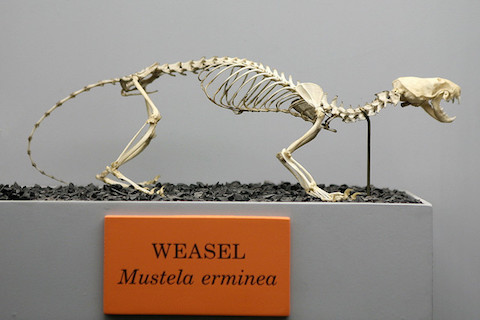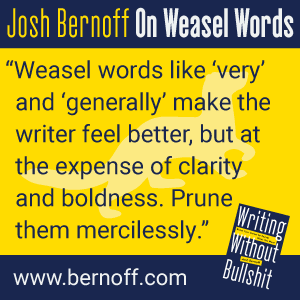A garden of poisonous weasel words

My post about the New York Times’ response to Donald Trump raised a few questions about weasel words. So today, I’ll clarify the different types and why you’re better off avoiding as many as you can.
My clearest take on weasel words is here. Here’s the definition:
A weasel word is an adjective, adverb, noun, or verb that indicates quantity or intensity but lacks precision.
As with all toxic prose, the point here is not to get rid of all weasel words. Your strategy is to get reduce them to the point where they no longer distract the reader and undermine your credibility. If any more than 3% of your words are weasel words, you sound like a faker and a liar.
Let’s look at all the different species of weasel words, including qualifiers, intensifiers, vague quantifiers, and weak verbs.
Qualifiers weaken prose
Qualifiers are words that attempt to weaken the impact of a statement by creating exceptions. They’re “out” words. Take a look at these pairs of sentences — which ones do you trust?
- We never take donations from hate groups.
- We rarely take donations from hate groups.
- Designers expect you to pay them for their work.
- Most designers expect you to pay them for their work.
- She got every question exactly right.
- She got nearly every question approximately right.
Notice that they come in both adverb and adjective forms. Adverbs like “nearly,” “rarely,” and “approximately” qualify the verbs and therefore the whole sentence. Always suspect and scrutinize adverbs; ask if they’re undermining the boldness of your statements. But weaselly adjectives like “most” can undermine you too, by qualifying the completeness of the group in question (“most designers”).
The more these qualifiers pile up, the more you sound uncertain, and the less we want to trust you.
Intensifiers strain credibility
Surely words that make a sentence stronger can’t be weasel words, can they? Well, actually, they can. “Very” is a particular problem. Again, a few pairs of sentences.
- I’m happy that you’ve succeeded.
- I’m really, sincerely happy that you’ve succeeded.
- Hillary Clinton is opposed to the TPP agreement.
- Hillary Clinton is very opposed to the TPP agreement.
- I love you.
- I actually love you.
- The governor is an accomplished speaker.
- The governor is an incredibly accomplished speaker.
These aren’t as bad as the qualifiers, but as Stephen Pinker points out, they can still undermine your sincerity. The reason: they put statements on a scale, and imply that they’re not absolute. Just how opposed is Hillary Clinton to TPP? Are you happy for me, or not? When you say you “actually” love me, I wonder if you might not.
Mark Twain famously (and apocryphally) said to replace every instance of “very” with “damn,” and then let your editor strike out the “damn”s. That’s on the right track, because “very” has no more actual meaning than “damn,” but “damn” emphasizes how arbitrary it is. I’m damn, damn happy that you’ve succeeded, and the governor is a damn good speaker. Intense, but arbitrary.
The verdict here is simple: you don’t need to avoid intensifiers. But you do need to keep a rein on them. Because the more they pile up (especially in press releases), the less credible you sound.
Vague quantifiers sound lazy
Can nouns be weasel words? Sure, if they’re vague quantifiers. Quantifiers are great if they’re precise — if I tell you that the cost of poor writing is $396 billion per year, you know exactly what I mean. But how much do you believe these sentences?
- The new skating rink is going to cost our town millions in police overtime.
- He spends lots of time playing with Lego instead of working.
- She will get back to you in seconds.
How many millions? How much time? How many seconds? That makes all the difference. Vague quantities are no better than vague intensifiers — they sound like they mean something, but not that much.
Weak verbs undermine meaning
You don’t need an adverb to be a weasel. You can do it with the right verb weakeners, too. For example:
- He tends to come in late on Thursdays.
- The contractor is expected to finish on budget.
- I want to believe you.
Does he come in late, or not? Will the contractor finish on budget? Do you believe me? Could go either way. So these sentences have very little meaning.
What to do about it
Writers, here’s my advice: find the weasel words in your prose, and delete or fix as many as possible by replacing them with bold, true, quantifiable statements. Get that weasel density down below 3%. Gird your loins and avoid qualifying your prose or loading it up with meaningless intensifiers.
All weasel words create problems, but these are the worst:
- Deeply (always a sign of bullshit)
- Most (makes statements sound strong without committing)
- Expected (who’s doing the expecting?)
- Lots (meaningless)
Once you’re aware of the problem, you can work on self-editing. And be on the lookout for weaselly prose from others, especially politicians and promoters. It means less than it appears to.

Josh, I wholeheartedly agree and even wrote a post about this on Word Wise with a list of the “most weasley” words I work to eradicate. goo.gl/3A40hN
Great stuff, Kathy!